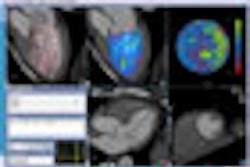ORLANDO, FL - In a head-to-head comparison, multidetector-row CT (MDCT) appears to trump whole-heart magnetic resonance (WH-MR) when it comes to detecting coronary artery stenosis, researchers say.
However, CT's advantage didn't hold up when researchers looked only at interpretable segments.
"In our study, we found MDCT to have a higher success rate over whole-heart MR, but when we looked at interpretable segments, there was little statistical difference between the two methods on a per-segment and per-vessel basis," stated Dr. Anne-Catherine Pouleur, the study's lead investigator and a research fellow in the department of cardiovascular diseases at Cliniques Universitaires Saint-Luc, Université Catholique de Louvain in Brussels, Belgium.
Pouleur discussed the findings at the 2007 scientific sessions of the American Heart Association (AHA).
For this investigation, Pouleur and her colleagues examined data on 77 consecutive patients (mean age 61 ± 14 years, 66/71 male) conducting both free-breathing 3D WH-MR and 40- and 64-slice MDCT angiography prior to invasive angiography, which served as the reference standard.
Two independent observers blinded to the results graded the images visually, implementing quantitative angiography to evaluate the diagnostic accuracy in terms of detecting luminal stenoses of greater than 50% in diameter in segments and vessels larger than 1.5 mm in diameter.
The researchers were able to perform MDCT for all 77 patients. However, WH-MR coronary angiography (WH-MRCA) failed in nine (12%) of the patients due to poor navigator performance. Additionally, they noted that the whole-heart procedure took considerably longer to perform compared with MDCT (20 minutes ± 4 for WH-MRCA versus less than five minutes for MDCT).
The researchers found that out of 992 segments with diameters greater than 1.5 mm, 49 had stenoses greater than 50%. When they examined all segments (including noninterpretable segments), they found that WH-MRCA reflected lower sensitivity (71% for MRI versus 92% for CT), lower specificity (68% versus 92% for CT), and accuracy (68% versus 92%) compared to MDCT.
However, Pouleur noted that when they examined only the interpretable segments, the differences between the two tests were less striking, reporting sensitivity of 95% for CT compared to 98% for MRI, specificity of 93% versus 94%, and diagnostic accuracy of 94% versus 94% for WH-MRCA and MDCT, respectively. Thus, considering only evaluable segments, the difference between the two modalities was not statistically significant.
While noting the advantage of MDCT in terms of faster exam time and lower costs, Pouleur concluded that WH-MR potentially offers patients with contraindications for CT a contrast-free, noninvasive alternative for diagnosing coronary artery stenosis.
By Jerry Ingram
AuntMinnie.com staff writer
November 6, 2007
Related Reading
MDCT promising for long-term prognosis in patients with chest pain, November 5, 2007
MR studies gauge heart risk after myocardial infarction, October 15, 2007
CTA predicts functional recovery of the myocardium, September 7, 2007
Simple scoring system predicts cardiovascular complications after PCI, June 22, 2007
Copyright © 2007 AuntMinnie.com




















